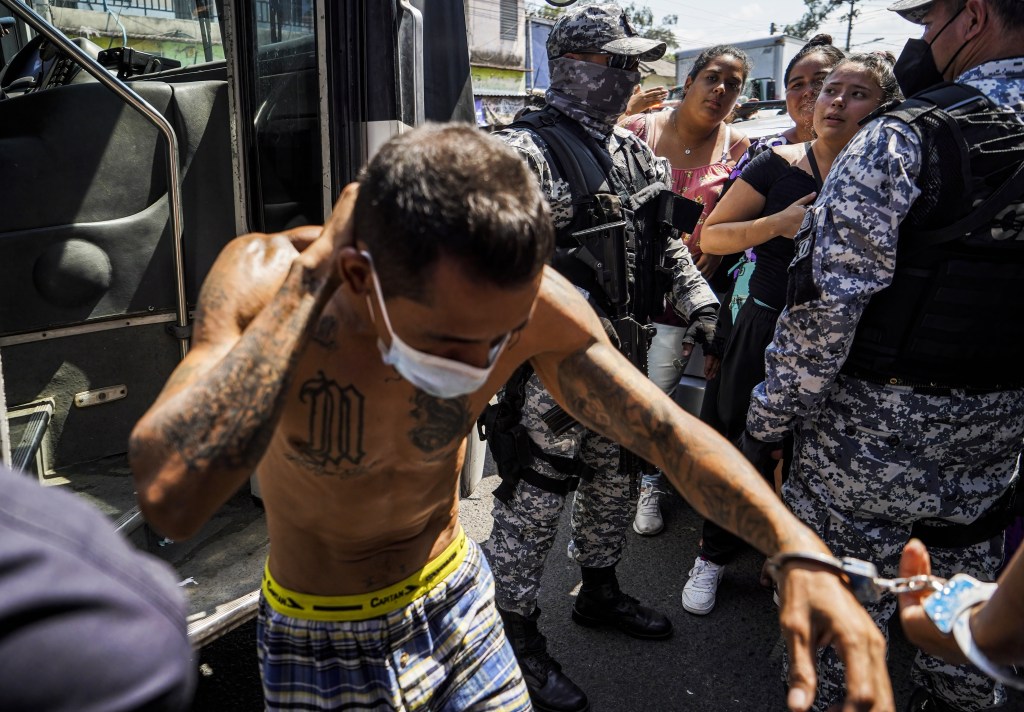Less than three weeks after a killing spree in El Salvador left dozens dead, President Nayib Bukele is boasting about arresting more than 10,000 alleged gang members and has moved one step closer to fulfilling his long-standing attempts to censor the media.
The harsh response by Bukele, who swept to victory in 2019 at the age of 37 by promising to confront a corrupt political establishment, has drawn rebuke from human rights groups and even shocked Salvadorans long accustomed to waves of violence and repression.
As the unprecedented crackdown continues, the mere mention of gang activity could land journalists who report on it in prison. A week after El Salvador’s Congress passed a sweeping law to punish anyone who shares information about gangs with up to 15 years in prison, some media outlets have curtailed their coverage in an effort to comply.
“Traditional television and radio outlets have understood this law as an order to stop talking about gangs,” said César Fagoaga, president of El Salvador’s Association of Journalists. Written outlets continue to cover gangs, he said, but they’re consulting with lawyers about what stories or phrases could run afoul of the law.
“There are internal discussions about whether or not to refer to the gangs. Or if a word could be badly interpreted and land you in prison,” Fagoaga said — a delicate if impossible dance in a country where gangs exert immense power and violence is a daily staple. “Media outlets and many journalists are in a state of shock.”
Already, a man who identified himself as a political analyst and member of Bukele’s political party announced on Twitter that he would be seeking charges against two journalists at investigative news outlet El Faro for violating the law by relaying “messages related to gangs in order to frighten the population.”
Videos by VICE
The offending article appears to be about how Salvadoran authorities released an MS-13 gang leader who had been sentenced to 60 years in prison for homicide and is currently being sought by the U.S. for extradition. The article was published on April 5, the same day the law was passed. Óscar Martínez, El Faro’s editor, said it was unclear if charges had actually been brought.
One person not complying with the law appears to be Bukele himself. His Twitter account is full of pictures of half-naked gang members who’ve been arrested, and he posted a video of heavily-armed soldiers arresting an alleged gang member and throwing him face-down onto the bed of a truck.
He has also been trolling human rights groups and high-ranking U.S. officials who’ve criticized his tactics. In an unusual rebuke on April 10, Secretary of State Anthony Blinken called on El Salvador “to uphold due process and protect civil liberties, including freedom of press, peaceful assembly, and expression.”
Bukele responded to Blinken with a taunt: “I have a journalist friend, he wants access to Gitmo [Guantanamo Bay] to exercise his ‘freedom of the press’ rights, and check if the detainees have enjoyed their ‘civil liberties’ and a ‘due process,’” Bukele wrote on Twitter. “You have terrorists that threaten you, and we have terrorists that threaten us.”
While Bukele has for years attacked the press and embraced a tough-on-gangs attitude, the immediate trigger for his most recent, most severe crackdown was the murder of 62 people in a single day in late March. Gang members randomly shot people walking in the streets, vendors, and anyone in their way in what was the worst violence on record since the end of the civil war 30 years earlier. Many analysts read the murders as a message from gang leaders to Bukele signalling the control they exert over the country.
Following the rampage, Bukele declared a 30-day state of emergency, empowering his government to tap the communications of Salvadorans without a court order, arrest people without evidence, and deny citizens the right to legal counsel and freedom of assembly.
El Salvador’s Minister of Justice and Security said this week that the government may extend the state of emergency for another 30 days. On Tuesday, Bukele wrote on Twitter that “10,094 terrorists have been arrested in 17 days” and said “We’re continuing the war against the gangs.”
A growing number of Salvadorans allege authorities have arrested relatives and friends who have nothing to do with the gangs.
Krysly Hernández told VICE World News that her 26-year-old brother was walking his dogs when police stopped him and arrested him. She said the only reason for the arrest seemed to be his tattoos, which in El Salvador are often a sign of gang affiliation. But Hernández said her brother, who grew up in the U.S. where body art is common, worked in call centers and had no ties to gangs. His tattoos were of skulls, roses and a basketball, she said, rather than images related to the major street gangs MS13 and Barrio 18.
Hernández said she went to the local police station to look for her brother but they refused to give her information, citing Bukele’s state of emergency.
“You have to leave,” she said a police officer told her. “And if you don’t, we will have to arrest you too.”








